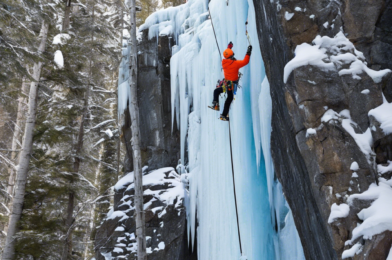Firstly, it’s important to recognize that fear is a natural and healthy response to the inherent risks of ice climbing. Channeling this fear into heightened focus and awareness can help climbers stay alert and attuned to their surroundings. Experienced climbers know that embracing this fear and using it to their advantage is key to performing at their best. Visualizing success and positive outcomes is a powerful tool in an ice climber’s arsenal. Envisioning oneself confidently executing each move, from planting crampons securely to swinging the ice tool with precision, can bolster confidence and reduce pre-climb jitters. This mental rehearsal not only helps climbers familiarize themselves with the required movements but also reinforces a positive mindset.
Believing in one’s abilities and possessing self-efficacy are critical. Climbers who trust in their capacity to overcome obstacles are more likely to persist in the face of challenges. This self-belief often stems from past experiences and accomplishments, so it’s important for climbers to reflect on their successes and draw strength from them. Goal setting is another effective strategy. Establishing clear, measurable goals provides climbers with a sense of direction and purpose. Setting incremental goals that lead towards a larger objective helps climbers stay motivated, track their progress, and maintain a positive mindset, even when faced with setbacks.
Ice climbing, by its very nature, demands resilience in the face of adversity. Climbers must accept that setbacks, failures, and unforeseen challenges are an inherent part of the sport. Embracing a growth mindset, wherein failures are viewed as opportunities for learning and improvement, is essential. Rather than becoming discouraged by a failed attempt, climbers who adopt this mindset see it as a chance to identify areas for growth, refine techniques, and cultivate mental toughness. Mentorship and camaraderie also play a vital role in the psychology of ice climbing. Engaging with more experienced climbers who can provide guidance, share techniques, and offer emotional support helps build confidence in less experienced climbers.
Furthermore, ice climbing is as much a mental endeavor as it is physical. Climbers must cultivate a strong sense of mental fortitude to persevere through physically demanding ascents. Focusing on maintaining a positive internal dialogue and adopting a problem-solving mindset are key aspects of this. Climbers must also condition their bodies to cope with the physical demands of the sport. Building physical resilience through specific training regimens helps climbers feel more confident in their bodies’ abilities, which translates into mental toughness on the ice.
The ability to manage stress and regulate emotions is another critical aspect of ice climbing psychology. Climbers must learn to recognize and control their emotional responses, especially in high-pressure situations. Developing techniques such as deep breathing, mindfulness, and positive self-talk enables climbers to maintain a calm and focused mindset, even amid the adrenaline-charged environment of ascending a frozen waterfall or scaling a towering ice column. Risk assessment and decision-making skills are also honed through ice climbing. Climbers must constantly evaluate the risks presented by the ever-changing conditions of the ice and make quick, informed decisions to ensure their safety.
To conclude, ice climbing demands a complex interplay of physical prowess and mental fortitude. Overcoming the fear and challenges inherent in this extreme sport requires climbers to develop a unique set of psychological skills. From embracing fear as a motivator to visualizing success, believing in one’s abilities, and adopting a growth mindset, ice climbers harness the power of their minds to ascend breathtaking frozen landscapes. By developing resilience, emotional regulation, and strong decision-making skills, they push the boundaries of what is possible and experience the incredible sense of accomplishment that comes with conquering these icy verticals.
